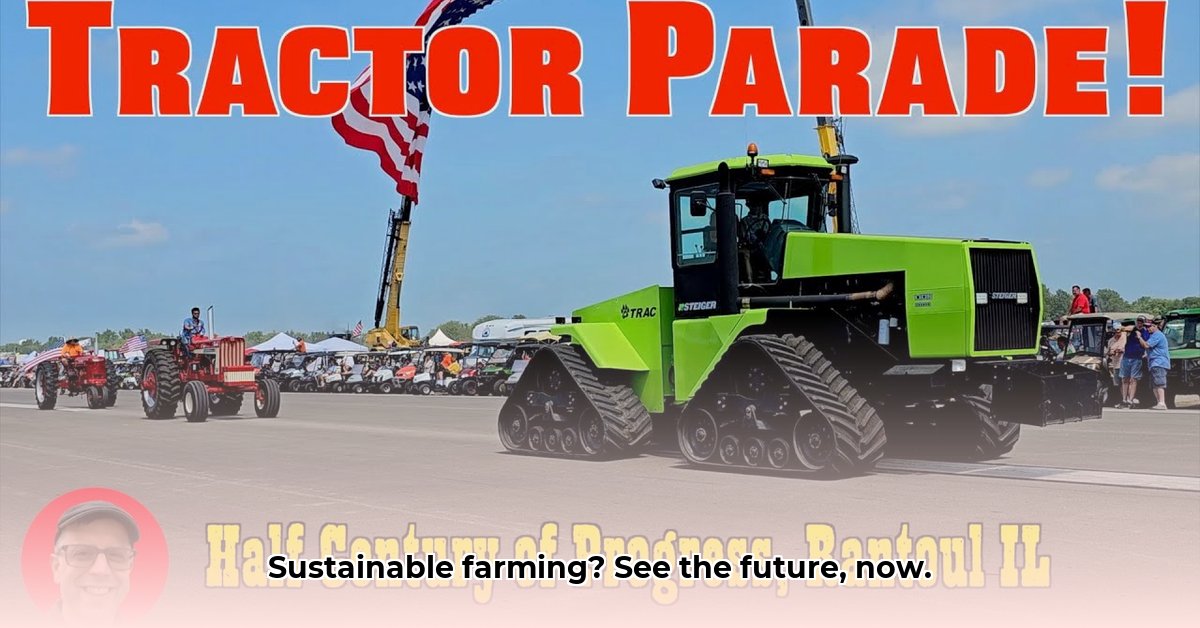
The Rantoul Half Century of Progress Show isn't just a nostalgic trip down memory lane; it's a living testament to agricultural history and a powerful platform for shaping a more sustainable future for farming. For decades, this beloved event has captivated audiences with the gleaming chrome of vintage tractors and the earthy aroma of freshly tilled soil. But what if this cherished tradition evolved, becoming a vibrant showcase for modern, eco-conscious farming methods? This isn't about abandoning the past, but about building a bridge to a more sustainable tomorrow – a future where tradition and innovation thrive together. For other tractor shows, check out this useful resource.
More Than Just Shiny Metal: A Blend of History and Innovation
The roar of antique engines, the friendly chatter of farmers, the feel of sun-baked earth underfoot – these sensory experiences are what draw people to the Rantoul Tractor Show. It's a captivating journey back in time, a connection to the roots of American agriculture. Yet, amidst the classic tractors, lies a significant opportunity: to highlight the next generation of farming practices – those kinder to our planet. Imagine a show where the past and future intertwine, showcasing both the rich heritage of farming and its innovative, eco-friendly advancements. Isn't that a compelling vision?
Engaging the Community: Hands-on Learning and Interactive Exhibits
The key to realizing this vision lies in creating interactive and engaging experiences, not just static displays. Think beyond traditional exhibits; let's design workshops and demonstrations that bring sustainable farming methods to life. Instead of merely discussing soil health, let's show people. How can we best achieve this?
A Step-by-Step Plan for Interactive Workshops:
- Planning: Collaborate with local universities, agricultural experts, and sustainable farming organizations to develop comprehensive workshop curricula. Themes might include precision farming, regenerative agriculture, water conservation strategies, and more.
- Recruitment: Engage experienced farmers, agricultural scientists, and sustainability advocates to lead these workshops. Their practical experience will make the learning both engaging and informative.
- Hands-on Activities: Incorporate hands-on activities, such as soil sampling and analysis demonstrations, interactive simulations showcasing the benefits of crop rotation, and live demonstrations of water-efficient irrigation techniques.
- Interactive Displays: Develop engaging visual aids including infographics, interactive kiosks, and virtual reality experiences to communicate complex concepts effectively. These visual tools can significantly enhance the learning process.
- Post-Workshop Resources: Provide attendees with online articles, webinars, and contact information for local experts, enabling them to continue their exploration of sustainable farming practices long after the show ends.
Potential Workshop Topics:
| Workshop Title | Description | Target Audience |
|---|---|---|
| Precision Farming for Beginners | Introduction to using GPS technology and data analytics for efficient and sustainable farming practices. | New and aspiring farmers, hobby gardeners |
| Regenerative Agriculture 101 | Explore techniques like cover cropping, no-till farming, and crop rotation to improve soil health and reduce environmental impact. | Experienced farmers, environmentalists, students |
| WaterWise Farming | Learn about water-efficient irrigation, rainwater harvesting, and water conservation methods. | All attendees, particularly those in dry regions |
Beyond workshops, picture a dedicated field demonstration area where visitors can witness side-by-side comparisons of traditional and sustainable farming techniques. The visual impact of seeing these methods in action would be profoundly powerful.
Showcasing the Future of Farming: Sustainability in Action
Envision exhibitors showcasing cutting-edge sustainable farming technologies: electric tractors humming quietly, solar-powered irrigation systems efficiently watering crops, and innovative seed technologies promising higher yields with less environmental impact. These aren't just gadgets; they're solutions for a healthier planet and a more resilient food system. This collaborative spirit would involve partnerships with universities, research institutions, and agricultural businesses, leveraging their expertise and resources to enrich the show. This collaborative approach will enhance the overall impact of the event significantly.
Measuring Success: A Framework for Growth
Assessing the success of this new direction requires a multifaceted approach. Tracking key performance indicators (KPIs) across various aspects of the show will illuminate the impact of the new sustainable initiatives.
| Metric | Target | Measurement Method |
|---|---|---|
| Workshop Attendance | 750+ attendees across all workshops | Registration data, headcount at each session |
| Exhibitor Participation | 25+ showcasing sustainable technologies | Physical count of exhibitors, booth space allocation |
| Visitor Survey Satisfaction | 85% expressing positive feedback | Online surveys, feedback cards at booths and workshops |
| Social Media Engagement | 1500+ mentions/shares across platforms | Social media monitoring tools (e.g., Brand24, Talkwalker) |
| Media Coverage | 15+ articles in local and regional media | Media monitoring tools, clip collection |
The Rantoul Tractor Show holds enormous potential. By embracing sustainable agriculture, the event can not only preserve its rich history, but also become a dynamic model for the future of farming—a model that inspires and educates while celebrating tradition and innovation. Let's work together to make this happen.